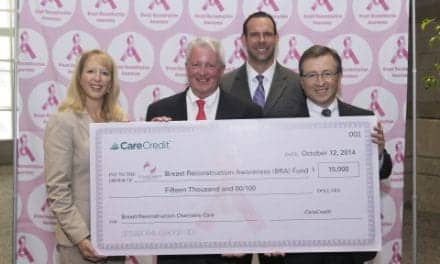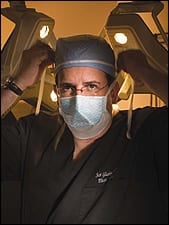 |
Listening to Scot Bradley Glasberg, MD, you soon become a believer. You believe that down economies come and go and that the only constant is to be prepared for those ups and downs. Glasberg may have been in practice for 11 years in New York City, but talking to him you’d think he’s been around for far longer.
This year, Glasberg has seen a drop in the number of aesthetic procedures in his practice. Who hasn’t? However, Glasberg is not slashing fees or laying off employees. He continues to charge for office visits and rarely gives a discount. His practice-management approach is not revolutionary. It is based on a pragmatic approach to managing referrals, cutting costs, and maintaining high visibility inexpensively.
“The depth of this recession has been pretty bad, probably the worst we’ve ever seen in cosmetic surgery,” Glasberg says. “Unfortunately, the economy drives these things, but the reality is that a normal, well-run business should self-reflect and review itself every few years.”
As for Glasberg’s own self-reflection and review, it has reconfirmed his moderate business philosophies, which have served his practice well for today’s economic challenges and tomorrow’s opportunities.
PATIENT FLOW MINUS FREE CONSULTS OR DISCOUNTS
Glasberg’s practice is located in mid-town Manhattan, perhaps the most competitive aesthetic and breast-reconstruction market in the United States outside of Los Angeles.
Although the aesthetic side of his business is down 10% to 15% this year compared to last year, Glasberg reports that his income has held about even thanks to his industry consulting work and the reconstructive side of his practice—which continues to grow.
Glasberg also credits reconstructive patients with partially feeding his practice through their interest in further aesthetic procedures after their recovery.
Regardless of where his aesthetic referrals come from, Glasberg does not offer free consultations—even with the downturn.
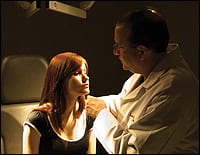 |
| 2009 income has stayed even thanks to Glasberg’s industry consulting work and the reconstructive side of his practice. |
“Obviously, for a family member or the wife of a colleague, they’ll get free consultations,” he says. “But somebody off the street, absolutely not.”
The reasons are a) Glasberg considers his time to be valuable and it carries a price tag, and b) free anything tends to give patients a “shopper’s mentality.”
Glasberg believes that people generally don’t take his advice and time seriously unless they’re paying for it. Therefore, charging for every consult saves him time, reduces his cancellation rate, and attracts a higher percentage of patients more likely to book surgery. If patients actually do book a surgery, Glasberg says he will dock the consultation fee, if asked.
In terms of discounts, Glasberg has not cut his rates, though he sometimes offers 20% to 25% off his fee to his steady clients, who often refer their friends.
“I know there are a lot of surgeons out there offering discounts now with the economy being so bad,” he notes. “I haven’t found the need to offer discounts, but I’m not sure that that sends the right message. I really believe that when patients come to a plastic surgeon, they want to see a strong character, a good feeling about the office. They want to see a lot of patients coming into the office who are happy. Once you start cutting your rates, people start to second guess [your quality].”
WORD-OF-MOUTH PR
Glasberg keeps a high flow of “serious clients” by doing minimal or no print or media advertising, which is another way to cut down on plastic surgery shoppers who are more concerned with his prices rather than his aesthetic advice and skill.
Glasberg lists himself on a select few Internet referral sites, but again he refrains from offering free consultations or other incentives. Instead, he relies on the most cost-effective outreach plan there is: word of mouth.
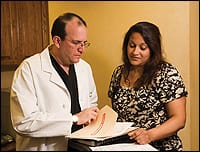 |
| Glasberg claims that the recession has changed the underlying business of plastic surgery. |
“The economy never tends to hurt word of mouth,” he says. “People who have relied too heavily on advertising in times like this get hurt the worst. With word of mouth, people will still give out your name. They may not be able to book surgery, but people will still be giving out your name, whereas practices that are just relying on patients coming in based on advertising are going to come down significantly in their business.”
Glasberg notes, however, that advertising dollars can be more effective in markets that have fewer providers and lower advertising rates, and where one can brand and define one’s practice from nearby competitors.
Whereas word-of-mouth PR is free and saves advertising dollars, it also requires a great deal of effort. To truly capitalize on a word-of-mouth model, Glasberg advises surgeons to remain conscious of maximizing one’s exposure via media contacts, professional organizations, or even by showing up at the right time for rounds at the hospital.
“In a downturn, if your practice is based on word of mouth, the most important thing is that you’re out there,” Glasberg says. “You want to make sure that you’re doing cases in the operating room so the people at the hospital see that you’re there.”
Glasberg used to make his rounds at 5:30 AM, when few colleagues or their support staff would actually see him, but recently he has purposely made sure he arrives around 8 or 8:30 in the morning.
“When they see you, it’s like, ‘Hey, he must be busy. He’s still around all of the time.’ I think, psychologically, people pick up on that because I’ve heard comments made about surgeons that aren’t around. They’ve said, ‘Oh, he must not be doing that well, because he’s not around anymore.’ ”
Glasberg is also politically involved with the American Society of Plastic Surgeons (ASPS), serving on its board and other committees, as well as sponsoring local breast cancer walks. Though he is genuinely interested and involved with these organizations, he also realizes that there may be residual benefits in the long run.
“I don’t want to seem idealistic,” Glasberg says, “but I spend a good number of my hours every week doing things on behalf of my specialty through my work for the ASPS. I find that on a long-term basis, that probably does translate into getting more patients and getting myself out there more.”
Another PR benefit of contributing his time to these boards: the media often seek out Glasberg as an authority. As a result, he has made friends with some of the local and national reporters in the New York City area. Often, when there is an interesting story related to plastic surgery these reporters will interview him. Surprisingly, Glasberg sees little benefit from national programs.
“The national exposure actually doesn’t get me a lot of patients. But a simple article that I did with Crain’s [New York Business] 3 weeks ago, which was published on the front page, gave me five or six patients. So, I found that the local media works a lot more to your advantage,” Glasberg says.
WORTH THE MONEY
Glasberg does not find it necessary to pay for a PR person right now, but he does find those services are valuable. “If things got worse for me, that’s something that I would seriously consider paying for. I think that’s worth it because my experience with the PR people is that they tend to know where the serious patients are.”
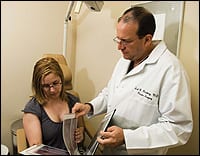 |
| Regardless of the economic downturn, Glasberg does not offer free consultations. |
The other kind of PR for which Glasberg will willingly pay is patient education events.
“The reality is that face time with referral sources and face time with patients is a great way to find clients,” he notes. “While I would not pay for advertisements, I would definitely pay for a patient function, which I’ve done in the past.”
For example, Glasberg heard of a nearby upscale sports club that held regular events with invited speakers. When they had a plastic surgery night, he spoke to a captive audience of about 150 women who were all age-appropriate for plastic surgery. For this speech, he donated a couple of thousand dollars to the club.
Similarly—and perhaps for no money—a physician could approach large law and financial firms to give a free educational presentation about new aesthetic surgery techniques, he adds.
Given Glasberg’s consistent visibility, whether professionally or through volunteering, it is unsurprising that 90% of his clients come from either patient referrals or other physicians.
REVALUATE COSTS, NOT EMPLOYEES
From the beginning, Glasberg has taken a cautious approach to his practice’s expenses. One of the best examples of his business pragmatism is that he is willing—and able—to share office space with another plastic surgeon, thereby cutting his costs for staff, supplies, and rent.
This arrangement, structured as a limited liability corporation, is all positive, he says. “I’m not here 3 days a week, so it’s positive on the expense side because I have somebody that I share space with and to share the expenses. It’s positive from a best utilization of time, and it’s also positive from the standpoint of someone being there to cover me. I think it’s a further positive because our practices are separate, so I’m still in control of my own destiny and still call my own shots, making my own decisions.”
Of course, Glasberg realizes that finding the right match isn’t easy. “I know the reality of the plastic surgery world,” he notes. “It takes a lot for people to get along well enough to actually work together. I think I’ve found the perfect person. We have complementary personalities, and our business sense complement each other really well. I know that’s not necessarily the norm, but if you can find a fit, that is the best.”
In terms of cutting expenses during the recession, Glasberg systematically went through all of his costs with his office mate, line by line, and found significant savings through either changing vendors or revisiting contracts.
Glasberg found plenty of companies offering discounts to attract—or keep—business. Several offered him volume discounts or a longer period of time for contract discounts. Other companies “were simply better,” he says.
Among the savings and investments revealed through Glasberg and his LLC partner’s evaluation:
- They changed payroll services. Not only was the new company less expensive, it also offered a better product, according to Glasberg.
- They switched their medical waste removal services and reduced pick-ups from twice per week to once per week, saving around 40%.
- They went from disposable gowns to less expensive laundered gowns.
- Although Glasberg planned to buy a laser for noninvasive aesthetic procedures, a second look made him scrap the program and decide to focus on the practice’s core business: breast and body aesthetic procedures and reconstructions.
- They are redesigning their Web site, which will soon include infrastructure for a quarterly newsletter and e-mail-based marketing blasts.
So far, no employees have been lost due to the recession, and Glasberg expects there won’t be any.
PREPARING FOR THE RECOVERY
For physicians who have been forced by the economy into having more downtime, Glasberg encourages them to get involved with more physician societies and charities and to advocate for the issues they truly care about.
In terms of supplementing their income during the recession, Glasberg recommends being a consultant to the industry.
“If you have something unique in your practice or something that you do that’s unique, there are plenty of companies out there via speaking bureaus or consulting arrangements that hire plastic surgeons all of the time to get their word out,” he says. “It helps legitimize the product that they’re trying to sell and legitimize the techniques. So, absolutely, that’s a great way to supplement your income in an economic downturn.”
Asked if he thinks the recession has changed the business of plastic surgery, Glasberg says that this is certainly a time to reassess. “I think that surgeons and practices are going to be much more careful on how they do business, how they assess where that next patient is coming from, and what that next dollar is going to be spent on,” he adds.
“Have you expanded too quickly or too slowly? Are you in the right space? Are your expenses and overhead correct? These recessions force that issue,” he says.
In the meantime, Glasberg’s staff is keeping a list of all of his “serious clients” who have put off aesthetic procedures due to the recession. Perhaps this summer, as the economy improves, Glasberg says, he will send them a reminder to contact him via his new e-mail system.
Tor Valenza is a staff writer for PSP. He can be reached at .




